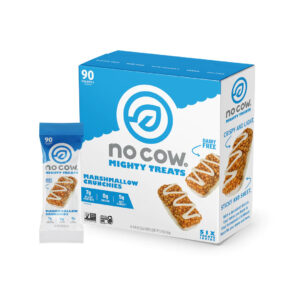No Cow protein bars have garnered attention for their dairy-free, high-protein, and low-sugar profile. Created out of a need for a plant-based alternative by founder Daniel Katz, they’ve become a sought-after snack for those avoiding dairy or seeking a vegan option. But the question remains: Are they truly healthy? This article dives deep into the nutritional profile, benefits, and potential downsides of No Cow bars.
Are No Cow Bars Good For Health?
With their high fiber content, No Cow bars can promote gut health. However, if you’re not used to consuming fiber-rich foods, it might be wise to start gradually. Their fiber content acts as a prebiotic, nourishing the gut and aiding good bacteria. But they contain artificial sweeteners like Erythritol, and Monk Fruit which are unhealthy, especially in the long run and if consumed on a regular basis.
Alongside this, one should consume fresh fruits and vegetables to ensure a balanced fiber intake. On the note of sugar alcohols, individual reactions can vary. Some may experience bloating, but many find No Cow bars easy to digest.
Regarding their macros, the bars stand out for their low sugar content and commendable protein levels, making them a healthier alternative to many protein bars in the market.
No Cow Bars Nutrition

Known for their clean, gluten-free, and non-GMO ingredients, No Cow bars provide a snacking solution without the downsides of many contemporary protein bars. While the nutritional values slightly differ between flavors, here’s a general breakdown:
- Calories: Typically between 190-210.
- Fat: Approximately 6-7 grams, half of which are saturated fats.
- Carbs & Fiber: About 27g of carbs, with 15g derived from fiber.
- Sugar: A minimal 1g, with an additional 5-8g from alcohol sugars.
- Protein: A commendable 20 grams of plant-based protein.
- Artificial Sweeteners like Erythritol, and Monk Fruit. This is one negative about this bar.
It’s worth noting that despite their low sugar content, they contain significant protein, making them stand out in the crowded bar market.
What Are The Different Types Of No Cow Bars?
As part of this No Cow review, let’s delve into the flavors and their specific nutritional facts:
No Cow Regular Protein Bars
| Flavor | Calories | Carbs | Sugar | Protein | Fiber | Price |
| Blueberry Cobbler | 190 | 25g | 1g | 22g | 16g | $32.99 for a box of 12, $2.99 each |
| Chocolate Chip Cookie Dough | 190 | 26g | 1g | 20g | 15g | $32.99 for box of 12, $2.99 each |
| Chocolate Fudge Brownie | 210 | 24g | 1g | 21g | 14g | $32 |
Conclusion
In summation, No Cow bars emerged as a distinctive choice in the vast protein bar market. Catering to those seeking dairy-free, gluten-free, and vegan options, they offer commendable protein content without compromising on taste or introducing excessive sugar. Their high fiber content champions gut health, though individuals should consume responsibly, especially if unaccustomed to high fiber intake. As with all dietary choices, individuals should assess their unique needs and consult with a healthcare provider if necessary, but for many, No Cow bars stand as a healthy and tasty snacking choice.
FAQs
1. Are No Cow Bars Gluten Free?
Indeed, each No Cow bar is a certified gluten-free protein snack. A third-party tester ensures there’s no trace of gluten or dairy, making them suitable for those with intolerances or sensitivities.
2. Do No Cow Bars Have Side Effects?
For the general populace, No Cow Bars don’t pose any side effects. However, those with nut allergies or sensitivities to certain ingredients, especially sugar alcohols, should consume with caution. If fiber is a new addition to your diet, starting with half a bar might be a good approach.
3. Are No Cow Bars Organic?
Currently, No Cow doesn’t offer any organic products. So, these vegan protein bars are not classified as organic.
After dissecting the health benefits of No Cow Bars, you might also be interested in determining if Larabars are good for weight loss.

